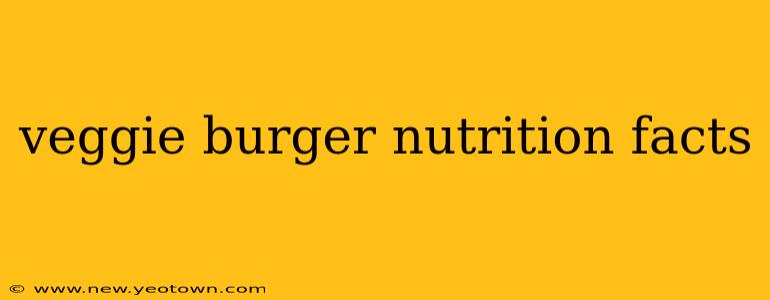Let's be honest, veggie burgers have come a long way. Gone are the days of bland, mushy patties that tasted vaguely of cardboard. Today, you can find veggie burgers crafted with exciting ingredients, mimicking the texture and flavor of beef, chicken, or even exotic blends. But with such variety, understanding the nutritional information becomes crucial. This isn't just about calories; it's about making informed choices that support your health goals. This detailed guide will explore the nutritional aspects of veggie burgers, helping you navigate the supermarket aisle and make the best selection for your needs.
What are the average nutritional values of a veggie burger?
This is a tricky question, as the nutritional content varies wildly depending on the brand and ingredients. Think of it like comparing apples and oranges (or perhaps, apples and… gourmet black bean burgers). A standard veggie burger, typically around 3 ounces, might contain anywhere from 150 to 300 calories. The protein content can range from 5 to 15 grams, while fat can fluctuate from 5 to 20 grams. Fiber is a significant player, often contributing between 2 and 8 grams per patty. Sodium levels are another area of variability, so always check the label.
How many calories are in a typical veggie burger?
As mentioned above, calorie counts are highly variable. A smaller, simpler veggie burger might clock in around 150-200 calories, while a more elaborate patty, packed with extra ingredients and oils, could easily reach 300 calories or more. It’s essential to read the nutrition facts panel on the specific brand and type of veggie burger you are considering. Don't just rely on generalizations!
What is the protein content of a veggie burger?
The protein content in veggie burgers is also quite diverse. Some patties rely heavily on legumes like beans and lentils, providing a decent protein boost. Others may incorporate grains, vegetables, and nuts, resulting in a lower protein content. Expect to find anywhere between 5 and 15 grams of protein per patty. If you're focused on building muscle or meeting a specific protein intake, checking the label is essential.
Are veggie burgers a good source of fiber?
Many veggie burgers are excellent sources of dietary fiber. This is largely due to the inclusion of legumes, whole grains, and vegetables. Fiber aids digestion, promotes satiety (keeping you feeling full), and can contribute to healthy cholesterol levels. Look for veggie burgers that boast 4 grams or more of fiber per serving – these will offer the most significant digestive benefits.
How much sodium is typically found in veggie burgers?
Sodium content is a frequent concern, especially for individuals managing blood pressure. Some veggie burgers are surprisingly high in sodium, owing to added salt and processed ingredients. Always check the nutrition label and opt for lower-sodium options whenever possible. Remember that even "reduced sodium" options can still contain a significant amount, so compare labels carefully.
How do veggie burger nutritional facts compare to beef burgers?
This is a critical comparison for many consumers. A typical beef burger will generally offer more protein and fat than most veggie burgers, while often being lower in fiber. The calorie content can be quite similar, depending on the specific veggie burger and the leanness of the beef. The key difference lies in the micronutrient profile: veggie burgers often contain more vitamins and minerals, particularly fiber, while beef burgers will offer higher amounts of iron and B vitamins. The “better” choice depends entirely on your individual dietary needs and preferences.
Are all veggie burgers created equal in terms of nutrition?
Absolutely not! The massive variation in ingredients and processing methods leads to significant differences in nutritional profiles. Some veggie burgers are minimally processed, packed with whole foods, and relatively low in sodium and unhealthy fats. Others may contain highly processed ingredients, added sugars, and excessive sodium. Reading the ingredient list and nutrition facts panel is vital before making a purchase.
What ingredients should I look for in a nutritious veggie burger?
Look for veggie burgers that emphasize whole grains, legumes (beans, lentils, chickpeas), and vegetables as primary ingredients. Avoid those with extensive lists of additives, artificial flavors, and excessive amounts of unhealthy fats (saturated and trans fats). The shorter and more recognizable the ingredient list, the better.
This guide provides a general overview. Always check the specific nutrition facts label on the product you are considering to ensure it meets your individual dietary needs and preferences. Making informed choices will allow you to enjoy the deliciousness of veggie burgers while reaping their nutritional benefits.

